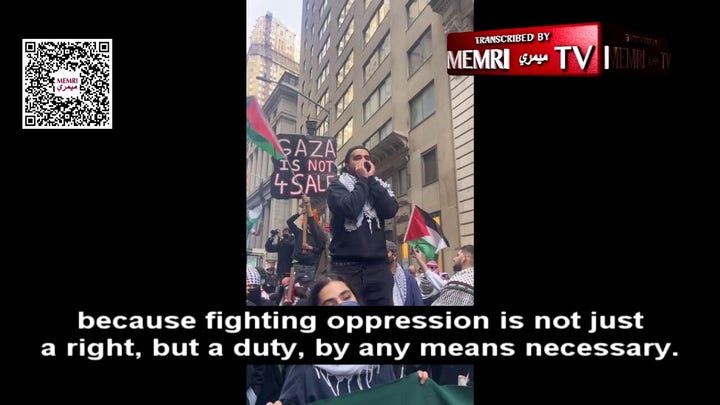When New York mayoral candidate Zohran Mamdani stepped to the microphone outside the Islamic Cultural Center of the Bronx last week near Yankee Stadium, his voice broke as he spoke about ‘the memory of my aunt who stopped taking the subway after Sept. 11 because she did not feel safe.’
Behind him, a Yemeni-American educator in sunglasses named Debbie Almontaser nodded. Almost two decades ago, in 2007, she was forced to resign as principal of a city school after defending a T-shirt with the slogan ‘Intifada NYC.’ City officials viewed it as a call to violence. She said it was benign. Her case became a rallying cry for Muslim American activists who cast her as a victim of ‘Islamophobia.’
Now, Almontaser was back, this time as a senior advisor to Emgage Action and a board member of Yemeni American Merchants Association Action, two of 110 political nonprofits, community groups and political action committees backing Mamdani as he alleges ‘islamophobia’ against him. Recently, when critics questioned Mamdani’s ties to hardline Brooklyn Imam Siraj Wahhaj, she sprang to action, helping to organize a protest to defend Wahhaj.
That rapid, coordinated response captured the modus operandi of a network of political operatives and clerics intertwined with the shared mission of catapulting Mamdani into the mayor’s office.
Mamdani’s background diverges from many of his co-religionists. In an interview, he said he is a Khoja Shia Muslim, part of a small, relatively liberal sect with roots in India. Many of his New York-area allies are religiously strict Sunni Muslims who practice more conservative interpretations of the faith. But they find common ground in politics.
‘It’s a sophisticated fusion of religion, politics and identity,’ said Mansour Al-Hadj, a Washington-based researcher on Muslim political movements and extremism. ‘The same networks that once focused on community services are now mobilizing voters and producing candidates. This is how political Islam adapts inside democracy.’
Mamdani’s God Squad includes about a few dozen key players who specialize in painting any critique as an attack on their faith, accusing critics of Islamophobia even as many of them have engaged in strident rhetoric against the U.S., Israel and capitalism.
Mamdani set off a firestorm on Oct. 7 when he walked into Masjid At-Taqwa in Brooklyn and later posted a photo of himself beaming beside the mosque’s imam, or prayer leader, Siraj Wahhaj.
The imam’s checkered past goes back decades. In a 1992 talk, he said American Muslims should elect an ’emir’ rather than choose between George Bush and Bill Clinton. Soon after, he served as a character witness in the trial of Sheikh Omar Abdel-Rahman, the so-called ‘Blind Sheikh’ convicted for plotting the 1993 World Trade Center bombing that killed six people.
‘You know what this country is?’ Wahhaj said in 1995. ‘It’s a garbage can. Filthy. Filthy and sick.’
In 2018, three of Wahhaj’s children were arrested after authorities found 11 malnourished children in a New Mexico compound tied to his family; a grandchild had died in what authorities described as an attempted exorcism. He told local news reporters, ‘Whatever they did wrong…it’s not acceptable to us.’
In New York, the Muslim American Society recently signed onto a letter to challenge ‘unmistakably Islamophobic, anti-Black, and xenophobic’ attacks on Mamdani. Signatories included CAIR National, the Council on American-Islamic Relations’ New York chapter, Islamic Circle of North America’s New York chapter, the Islamic Center of Five Towns, Muslim American Society of New York, Muslim Community Network, Rockaway Islamic Center, and a ‘Syosset Muslim Community.’
Members of the Muslim American Society have long been quick to accuse others of Islamophobia even as they unabashedly call for violence against their perceived enemies.
At an Eid celebration earlier this year, a cleric at the Muslim American Society, cast Muslims as victims worldwide. Mohammad Badawi, youth director at the Muslim American Society, declared the local community’s joy would only be complete when Muslims are ‘victorious worldwide,’ adding they would celebrate ‘after the destruction of the illegitimate Zionist occupiers,’ Israel.
He regularly organizes anti-Israel protests in a campaign against ‘injustice and oppression.’ At one protest, Badawi urged youth to ‘fight back’ against injustices ‘by any means necessary.’
The Street Protester: ‘Globalize the intifada’
Abdullah Akl, a charismatic organizer with the Muslim American Society Youth Center, leads many protests under the banner of ‘Within Our Lifetime,’ with founder Nerdeen Kiswani. Mamdani joined them before his run for mayor.
Akl calls the street protests ‘sacred activism,’ a mix of faith and resistance that will ‘free Palestine.’ Since the Oct. 7, 2023, Hamas attack on Israel, the Muslim American Society Youth Center has organized prayer protests on Wall Street outside the New York Stock Exchange, street protests for ‘Nakba Day,’ calling the day Israel was created a ‘catastrophe’ and youth-led demonstrations outside BlackRock.
